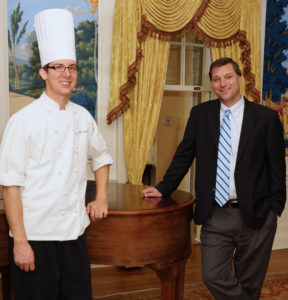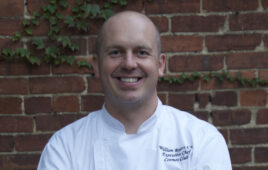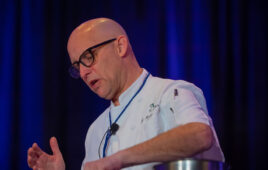Maurice Darbyshire, General Manager of Belmont Country Club, Ashburn, Va., and Vice President – Operations of Toll Golf, brings a unique perspective to the operations he oversees.
As a self-proclaimed “golf guy turned F&B guy,” Maurice Darbyshire, General Manager of Belmont Country Club, Ashburn, Va., and Vice President – Operations of Toll Golf, the golf and country club operating division of Toll Brothers, Inc., brings a unique perspective to the operations he oversees.
Darbyshire’s background in the private country club industry is exclusively with management companies, including eight years with ClubCorp and five years with Fore Golf before joining Toll Golf in 2006.
One of the most striking things about Darbyshire’s impressive career trajectory is how he came to value the role that a relevant F&B program plays in a club’s overall health, and how that knowledge has helped to shape his club management philosophy.
C2C: You started your club career as a caddy, right?
MD: Correct. After college, I returned to the club where I caddied in high school, looking to get into membership sales. ClubCorp had just purchased the facility and there was an opening. They had me take a test to see if I would be a good fit, and it basically told them I was not salesman material.
C2C: What kind of material were you?
MD: Management, apparently. Soon after, I went through an intensive training program with ClubCorp where I was able to touch every aspect of a club. It was fascinating. The only thing I didn’t do was mow the greens. That experience gave me a tremendous knowledge base that helps me to act as a resource to any department at any time.
C2C: You were then transferred to Washington, D.C., to work in a city club. What was that like?
MD: It was intense. At lunch the club would do anywhere between 190 and 250 covers in a two-and-a-half-hour period, in two different outlets. There were plenty of days I would tell the F&B Director that I was in the weeds. He would simply tell me that there are no weeds, and to keep at it.
C2C: Did you eventually get the hang of it?
MD: I did. The regional VP’s goal was for me to understand how a truly busy F&B operation functioned, so that I could not only grow, but also develop a better appreciation for the role F&B plays in a club’s well-being.
C2C: It must have worked, because from there, you went on to a handful of F&B roles before shifting over to club management.
MD: Once I worked in F&B, I couldn’t go back to being a ‘golf guy.’ That experience opened my eyes to the role F&B plays in a club, not only from a member-satisfaction standpoint, but from a revenue standpoint, too.
C2C: So do you think F&B is important to the overall success of a property?
MD: Absolutely. But it can also be the demise of a club. If you don’t do F&B correctly, you can lose your shirt. But if you structure F&B to drive revenue, and you put out quality product with quality service, it can easily become the backbone of a club.
C2C: What are some ways you ensure value for your members when it comes to F&B?
MD: We have found that providing a quality product with quality service at a value-based price increases participation. We strive to keep costs in line and create deals for members that excite them.
C2C: Can you give me an example?
MD: Our Wine Deal is a perfect example. Members can purchase a highly ranked, Parker-listed wine from their club at $10 above cost. Each club can customize the list based on their members’ preferences or seasonality. It’s been really successful and has helped to drive traffic and wine sales.
C2C: Toll Brothers generally builds clubs as an amenity to home sales. Do you think this affects how you approach F&B?
MD: In a way, yes. We make business decisions based on the greater good of the club, as it’s the epicenter of the community.
C2C: How so?
MD: For example, we’ll employ an experienced executive chef and sous chef and pay them both higher salaries than most clubs or management companies would, because we see the value that level of talent brings to the operation. If the club is successful, the community benefits. If it’s not, the community suffers.
C2C: When the community is sold out, does anything change?
MD: Toll does a really good job of setting up the facility from the get-go to guarantee buy-in. Most communities have a mandatory membership. With that, you create a dues line that can run around $4 million. You have to treat those members and that property accordingly. Things don’t change inside the club because we’re sold out. In fact, in most cases, things continue to improve and evolve as a result.
C2C: What do you think a club manager’s role should be in the overall operation of an F&B department?
MD: First and foremost, you can’t be successful as a manager without good people. It’s important to surround yourself with quality individuals, to identify the right people and encourage and motivate them. So finding a high-caliber chef and giving that person the tools to do their job well is incredibly important.
Second, as manager, you need to make sure that training is a major part of the staffing process.
Third, the club manager needs to be there to support the F&B department in whatever ways necessary. There have been plenty of times when I’ll put forks on tables or help expedite during a rush. It’s a team effort, and it’s important for the manager to actively be a part of that team.
C2C: What are some of your F&B goals within Toll?
MD: I have two. First, I would like to work on building up our bench strength to identify and cultivate the next leaders at each of our properties. I’d like to create an employee matrix that identifies rising stars, so managers can help them grow and prepare them for the next steps in their careers.
My second goal is to find smart ways to grow our catering business. There is tremendous opportunity and it doesn’t always mean every catered event is the right one for our clubs. We need to pick the right events and grow catering revenue across the board.
C2C: Last question: What are the secrets to a well-run F&B operation?
MD: Teamwork, value and responding to your members’ wants and needs.
The idea that there’s a front of the house and a back of the house is dated. The service staff and the kitchen staff have to work as one unit—one can’t be successful without the other. And if you’re charging dues for access, you have an obligation to your membership to drive value and make their dues dollars count.
Plus, as a private club, we have a captive audience, so success can only be found if you understand your membership’s needs, and provide F&B experiences accordingly.



